Become a Creator today!Start creating today - Share your story with the world!
Start for free
00:00:00
00:00:01

Arthur Conan Doyle (part 1)
In the first episode of the Doyle series, Sarah and Brook discuss Sir Arthur Conan Doyle and his famous detective, and his contribution to popular culture (and forensics).
We discuss:
A Study in Scarlet (1886)
Lost World (1912)
“The Case of Lady Sannox” (1893)
“The Five Orange Pips” (1891)
“The Crooked Man” (1893)
Ms. Sherlock (Japanese TV adaptation)
https://www.arthur-conan-doyle.com/index.php/Biography
https://www.arthurconandoyle.com/biography.html
For more information: cluedinmystery.com
Instagram: @cluedinmystery
Contact us: hello@cluedinmystery.com
Music: Signs To Nowhere by Shane Ivers - //www.silvermansound.com
Transcript
Introduction to Sir Arthur Conan Doyle
00:00:10
Speaker
Welcome to the Clued In Mystery podcast. I'm Sarah. And I'm Brooke, and we both love mystery. So Brooke, today we're going to talk about Sir Arthur Conan Doyle, and I'm really excited about this. I am too. I'm excited to move from Agatha Christie. We've covered the Queen of Crime, and now we're going to talk about a predecessor, Sir Arthur Conan Doyle.
Early Life and Education
00:00:33
Speaker
Arthur Ignatius Conan Doyle was born in Edinburgh in 1859. He was the second of seven children, and he was very close with his mother who loved books, and she passed her storytelling gifts on to Arthur. His immediate family was not as well off as his other relations, and the wealthier branch paid to send him to boarding school, which, consistent with the educational philosophy of the time, was rather harsh.
00:00:57
Speaker
And while he was away at school, he started writing to his mother regularly, which he continued to do throughout his life.
Family Life and Legacy
00:01:04
Speaker
His first wife, Louisa, died after they'd been married for 19 years. He met his second wife, Jean, while married to Louisa, but Arthur and Jean had a platonic relationship until his first wife died.
00:01:16
Speaker
He had five children, none of whom went on to have children of their own. So he has no direct descendants, but he does have grand mises and grand nephews who are currently part of his estate and legacy.
Literary Contributions
00:01:28
Speaker
Sir Arthur Conan Doyle is credited with the success of the Strand magazine, which is where many of his works first appeared. And so his first Sherlock's home story actually was published in the Strand magazine in one of its first issues. And that was in 1891.
00:01:43
Speaker
But he actually started writing before that. He started writing while he was studying medicine in Edinburgh, and his first short stories were published in 1879 during that time. He wrote his first Sherlock Holmes novel, A Study in Scarlet, in 1886, and that was published the next year. Between 1887 and 1927, he wrote a total of four novels and 56 short stories that featured Holmes.
00:02:06
Speaker
And he actually killed Holmes off in 1893 after 27 stories, and after pleas from publishers and fans, ended up bringing him back eight years later and went on to write another 31 stories between 1901 and 1927.
00:02:23
Speaker
In addition to writing detective stories, he wrote fantasy, science fiction, historical novels for a total of 22 novels, 13 stage works, four volumes of poetry, 10 non-fiction books, 13 books about spiritualism, and over 200 short stories and articles, so a very prolific career. He was knighted in 1902, and this was after working at a field hospital during the Boer War. He was officially knighted for services to the crown during the Boer War.
00:02:52
Speaker
But apparently King Edward was quite a big fan of Sherlock Holmes, so perhaps that had something to do with it as well.
Interests Beyond Writing
00:02:59
Speaker
Outside of writing, he lived a varied life. He ran unsuccessfully for political office. He was very sporty. He played football, cricket. He is credited with judging the first bodybuilding competition.
00:03:12
Speaker
He was an amateur boxer, a golfer. He's credited with popularizing downhill skiing. I saw in one place that suggested that he invented downhill skiing, but I'm not sure if that's the case or if he just was because of who he was and because he enjoyed it. You know, other people took up the sport as well. Because of his writing detective stories, he became interested in investigating true crime and investigated two closed cases, which ended up in their convictions being overturned.
00:03:42
Speaker
You think about the popularity of true crime podcasts now and the investigations that people do into closed cases or unsolved cases. I can kind of imagine him doing something similar without having the platform of a podcast, but sort of following that same process.
Spiritualism and Later Life
00:03:59
Speaker
He was a big believer in spiritualism. In the later part of his life, he spent a lot of time searching for
00:04:06
Speaker
poltergeists, attending séances. He believed in psychic abilities and he actually performed what is described as spiritualist missionary work in Australia and New Zealand and gave talks in Europe and in the United States about spiritualism. He was linked to a hoax that involved a fossil that was believed to be an early human. So he really had a varied life in addition to all of the writing that he was doing.
00:04:34
Speaker
So Arthur Cannon Doyle died in 1930 from a heart attack in Crowborough in the United Kingdom. That was so interesting, Sarah. I learned lots of things about Doyle that I didn't know before. Like I didn't know that he didn't have any direct descendants. I thought that was really interesting because I knew that he had been married twice. So I think I just had the assumption that, you know, he had children. I love that he wrote those letters to his mother.
00:05:03
Speaker
Like, that was a really endearing thing about him that he continued to write those letters and stay in touch with his mother. I know that his mom had some feelings about him killing Sherlock Holmes off, and I believe in a letter she told him not to do it, so that was neat.
Contrasts in Beliefs: Science vs Spiritualism
00:05:20
Speaker
Yeah, and I also loved learning more about the spiritualist side of him because he was so dedicated to science and really wanted Sherlock to be solving his cases based on scientific theories, but yet he had this other side to him. It was like a complete other side of the coin where he believed in spirits and seances and fairies and things like that. So very, very interesting. I loved that.
00:05:50
Speaker
Yeah, I think that's really interesting as well. And of the works that he wrote, I've only read things from the Sherlock Holmes area of his writing. But one of his science fiction books is called The Lost World. And it's actually what inspired the book Jurassic Park, Michael Crichton's Jurassic Park. So it features ancient animals that have survived time.
00:06:16
Speaker
I think it's really interesting that he had so many interests and pursued them in his writing. By far, he's most well known for his Sherlock Holmes. That certainly is what brought him to success, and perhaps that's what gave him the space to explore his other interests and the other things that he ended up writing about.
00:06:35
Speaker
Yeah, that's true because the Sherlock stories really, you know, they paid the bills whether he liked it or not. And I think he had mixed emotions about being considered a genre fiction author or commercial fiction. You're right. They did pay the bills. He became sort of his own art patron and it allowed him the space to write some of his other literary things or or the short stories that
00:07:05
Speaker
don't have Sherlock Holmes in them. I was surprised to learn that there are like a hundred short stories that don't feature Sherlock Holmes. I actually read in learning more about him, The Lady of Sanax, and it is so creepy and very like Poe feeling to it. And so it's neat that he had that liberty to be able to expand and write all the different types of work that he wanted to. And I don't think that
00:07:34
Speaker
probably the casual reader realizes that that was the case. Because he wrote so many stories that featured Sherlock Holmes, you could spend so much time just reading those, right? And there are people who do that. And I think one of the things that's most fascinating about him is
Enduring Legacy of Sherlock Holmes
00:07:56
Speaker
the legacy that comes from Sherlock Holmes, right? There's societies dedicated to that character. We can talk a little bit about all of the different adaptations and interpretations of that character, but there are people who are very passionate about Sherlock Holmes, which actually makes me a little bit reluctant
00:08:20
Speaker
to talk too much about Doyle because I know there are people who have studied far more than I have about him and know so much more about him. And I don't know if I can think of many other people that inspire that kind of passion.
00:08:38
Speaker
Of course, there are other literary societies, but I wonder if there's anyone who has left this legacy of as many different societies. If you Google Sir Arthur Conan Doyle, there's several websites that feature bios and information about him and his life.
00:09:00
Speaker
all of his works, right? So, you know, he's someone that has inspired a lot of passion and a lot of discussion. And one of the things that came up a couple of times was how you do a survey now about which historical characters or historical personalities are real or fictional.
00:09:20
Speaker
A surprising amount of people think that Sherlock Holmes was a real person. And an equally surprising amount think that Winston Churchill was fictional. I think that speaks to Sherlock's place in popular culture.
00:09:36
Speaker
precisely. Even in Doyle's day, there were people who assumed that Sherlock Holmes was a real guy living on Baker Street and would show up knocking on the door because they wanted him to solve a case for them or would send letters.
00:09:53
Speaker
requesting that Sherlock Holmes help them with something. It started really early where there's this assumption that it was this real person. I think that it was also a huge selling point to his stories and the success of them because I read that the comment was that it felt like it could be real because he was writing about a real neighborhood or real streets of London in the same time period.
00:10:18
Speaker
It really created this sense that you might turn the corner and walking down London in the late 1800s and see Sherlock Holmes, he might be prowling the neighborhood looking for clues. He really set it up to be that feeling that he was a real guy. It worked because like you said, it's actually like a whole culture, a whole society or societies that have built up.
00:10:46
Speaker
around studying him and I guess I would even go so far as to say like emulating him or wanting to be like him. So it's amazing and I agree with you. I don't think there are any other characters or authors who have
00:11:01
Speaker
reached that. Maybe someday somebody will be talking about Harry Potter in this way. Yeah, I mean, that is a good point. And I think there are Harry Potter events, right? And there's amusement parks that are built up, recapture some of the scenes in the films. So there is some of that. And, you know, yeah, maybe Harry Potter. But I wonder if the fans grow out of Harry Potter, but people don't grow out of Sherlock. I don't know.
00:11:30
Speaker
That can also explain sort of the, like you mentioned, the different variations of Sherlock, because in maybe in order to keep it alive and as powerful, you know, we've brought him into the 20th century. Sometimes Watson is portrayed as a female. We've kept it fresh and alive as, as readers and as fans. It's definitely thriving, continuing. And I would agree with you, like I do not want to
00:11:58
Speaker
say that I'm an expert on Sherlock Holmes at all. There are people out there who know so much more about his work and about him, but I just I would just say I'm a fan and I'm interested in learning more because he's such a fascinating author in this genre.
00:12:12
Speaker
Yeah, well, and I think Doyle certainly can be credited with popularizing detective fiction, right? And that detective and his sidekick investigating really difficult cases. I read a couple of his short stories where he actually was unsuccessful, right? Someone would come to him and say, I need some help. And then the story concludes with his client dying, right? So Holmes being unsuccessful in preventing that from happening.
00:12:41
Speaker
And he figures out who's behind it, but isn't successful in keeping his client alive, which, you know, there's probably not a lot of that that we see. The sleuth will prevail. I wonder how the fact that these were written, serialized and released because, um, rather than, you know, the arc of one long novel, for instance, then, you know, they, you want your sleuth to prevail at the end, but.
00:13:06
Speaker
because they were done kind of as episodic or in episodes, you're going to have those ups and downs of the flow of the story. You're going to have the dark moment when you think your character's just never going to be able to prevail. And so in a sense, those failures of the little short stories were kind of like creating that overarching plot line that kept readers coming back because you want to see him win the next time.
00:13:35
Speaker
It's actually, I don't have to say he's a genius. We know it, but it's very genius. Yeah. Yeah. Yeah. I mean, he's left a big, a big legacy and you know, I don't know if I would be writing mysteries were it not for him popularizing the genre.
00:13:54
Speaker
for sure. Well, and this is sort of a little off topic, but I found this super fun because my daughter is currently taking a forensic science class in high school. And she came home the other day and said, did you know that we only have forensic science because of Sherlock Holmes? And I always thought in my mind that those sciences were developing in the 19th century.
00:14:23
Speaker
And so he extrapolated and created Sherlock Holmes who would then solve these cases based on scientific means. But no, it actually happened reverse. Sherlock Holmes' story, so he created this sleuth who was not gonna find things out coincidentally or by word of mouth. He was going to have these scientific and medical solutions to cases. And it got the police departments thinking, hey,
00:14:51
Speaker
That's actually a really great idea. Maybe we should try to solve crime like that. And so it happened in reverse. Literature actually shaped the way crimes are solved in our world. It was very fortuitous that she learned that this week because now I can talk about it here. That is fascinating. I thought the same thing as you that it had, you know, he was inspired by scientific developments, but wow.
00:15:17
Speaker
Yeah. It made me really proud to be an author, to be honest. Like, you know, art matters. A hundred percent. No, I didn't realize that. Well, and we'll talk about this later, but the fact that he started being involved in investigations, right? That, you know, as you said, he would receive letters asking for Sherlock to investigate. There must have been something in, you know, a couple of those letters that inspired him to actually do it himself. Right. I can't imagine. I can't imagine doing that.
00:15:46
Speaker
I was going to say he must have had to learn about the police methods, but if he was shaping them, then I guess he didn't. Isn't that crazy? Yeah. He definitely had his medical background to lean on. He was actually a surgeon. He had more practical skills than a lot of us who write mysteries, but still I'm with you. I can't ever imagine saying that I could do it in real life.
00:16:08
Speaker
So it's so fascinating those stories and we'll talk more about those. I mentioned, you know, I read some of his stories to prepare for this. One of my favorites was one of the ones in which Sherlock was unsuccessful. I don't know if you read Five Orange Pips.
00:16:23
Speaker
No, I didn't. So the other thing that struck me about this, in addition to Holmes being unsuccessful, was that the story talks about the KKK. And we talked about this with Christy, where she wasn't afraid to kind of talk about things that were happening in the real world, right? Or, you know, events that had happened. Yeah, I just thought it was really interesting, this element being part of this story.
00:16:51
Speaker
Yeah, that's fascinating. I read The Crooked Man. There are some cultural and societal things that he brings up in that story too. I had the same thought. I thought, oh, we talked about this in Christie, how she wasn't afraid to have a little commentary on some of those things that were influencing their world at the time. I think it's interesting. We shy away from it much more, at least
00:17:17
Speaker
That's my feeling in our era. And I really have to tip my hat that they were brave enough to, I don't think they ever shared very strict political views one way or another, but they definitely were commenting on what was happening. And it makes it a really good part of a historical read then too, because you get that context. It makes it all the more fun for me.
00:17:41
Speaker
Yeah, absolutely. I agree. I think that present day authors tend to shy away from those what could be considered controversial topics. And I think we can look to how Christie and how Doyle, as you say, didn't make any political commentary, but acknowledged that those were things that were happening. And clearly audiences were receptive to that.
00:18:08
Speaker
It added another layer of what we said before that it made it feel so real to them. They were living that too, and it just helped create the world for them, the literary world for them.
00:18:23
Speaker
One of the other things that I wanted to mention is, you know, I talked about the letters that he wrote to his mom and you said you actually saw them.
Personal Insights from Doyle's Letters
00:18:31
Speaker
One of the websites that I looked at, and I'll make sure that it goes in the show notes, you can see copies of the letters that he wrote and they have several of them. So there's a lot of information and a lot that you could dig into about him, you know, if you wanted to learn.
00:18:47
Speaker
more. Again, I don't know if there's many other authors that have that kind of status in people's minds and in people's lives. Even if you're not a mystery fan or somebody who reads in this genre a lot, everybody knows who Sherlock Holmes is. I mean, that goes back to what you said earlier that some people think that Winston Churchill
00:19:09
Speaker
is a fictional character and Sherlock Holmes is not. I mean, everyone knows who Sherlock Holmes is and I don't know that, you know, you probably couldn't even say the same thing for Poirot or Miss Marple. You could put that name out there and people wouldn't necessarily automatically know who that is, but everyone knows who Sherlock Holmes is.
00:19:28
Speaker
That's a really good point, and I think it's not just everyone in the English-speaking world. I imagine that's true for internationally. Good point. We watched a modern-day interpretation or adaptation, and it was
Modern Adaptations of Sherlock Holmes
00:19:44
Speaker
called Ms. Sherlock, and it was Japanese. The Sherlock character was a woman, as was Watson, the Watson character, but she was a consulting detective for the Tokyo Police.
00:19:55
Speaker
and had a lot of those characteristics that you associate with Sherlock. She had a little scientific laboratory where she could do a little bit of analysis. She was abrupt and she was perhaps socially awkward and didn't have a wide circle of friends.
00:20:12
Speaker
What I thought was interesting is that Sherlock acknowledges that, and I don't remember which of the stories it was that I read where he does that. He knew he had flaws, which I thought was interesting, certainly in the source material. He knew he had flaws.
00:20:27
Speaker
I'm interested to know if some of that self-awareness came later, like after he came back from the dead, so to speak, if Doyle worked out some of the things that he didn't like writing Sherlock, if he made him maybe a little more personable, I don't know, likable later. I don't know the timing of that story, but it makes me wonder if he found ways to enjoy writing him more.
00:20:53
Speaker
That's a really good question. And I don't know the answer to that. I think that just adds to what you mentioned earlier about his being relatable, right? Because he had these flaws and he wasn't, he wasn't this perfect, perfect detective. Yeah. And in a lot of ways he's not relatable, right? Like he puts these incredibly ingenious things together.
00:21:16
Speaker
And we feel more like Watson, at least I do when I read a story, I follow along feeling like kind of like the bumbling Watson sometimes. But yeah, so you need that balance of the things that are not as likable to some of those more, maybe inward personal things about him. So I think that's,
00:21:36
Speaker
think that was a good choice. Okay. Well, I think that is it for right now. We will do, this is just the first of a couple of episodes that we're going to do about Doyle. In the next one, we'll talk a little bit more about some of those adaptations as well as how and how it was that he wrote. So we can talk about that in the next episode as well.
00:21:59
Speaker
Thank you for listening. We hope you enjoyed today's episode. We'd love to hear what you think. You can reach us at hello at cluedinmystery.com or send us a note on Instagram at cluedinmystery. Thank you for joining us. I'm Brooke. And I'm Sarah. And we both love mystery.
00:22:16
Speaker
Clued in Mystery is produced by Brooke Peterson and Sarah M. Stephen. Music is by Shane Ivers at Silvermansound.com. Visit us online at cluedinmystery.com or social media at Clued in Mystery. If you liked what you heard, please consider subscribing, leaving a review, or telling your friends.
![[Re-release] Anthony Berkeley image](https://media.zencastr.com/cdn-cgi/image/width=112,quality=85/image-files/61e1c276e3ec42007857cff9/e7c778ac-a2ba-4809-9a5c-7cd39d167834.jpg)
![[Bonus] Wake Up Dead Man image](https://media.zencastr.com/cdn-cgi/image/width=112,quality=85/image-files/61e1c276e3ec42007857cff9/e276ac32-e664-464f-956c-7699bdb60aa5.jpg)
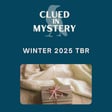
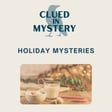
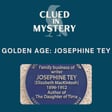
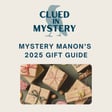
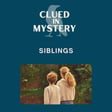

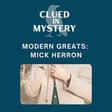
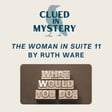
![[Bonus] Read Along: Daughter of Time image](https://media.zencastr.com/cdn-cgi/image/width=112,quality=85/image-files/61e1c276e3ec42007857cff9/b953ad72-c43e-48ca-a18a-b3c216ab90ee.jpg)
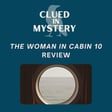
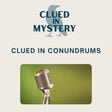
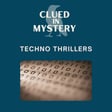
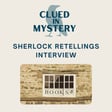
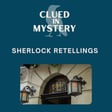
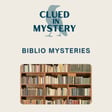
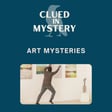

![[Bonus] Thursday Murder Club preview image](https://media.zencastr.com/cdn-cgi/image/width=112,quality=85/image-files/61e1c276e3ec42007857cff9/e51be644-e446-4d32-b89c-12bfc60d30e9.jpg)